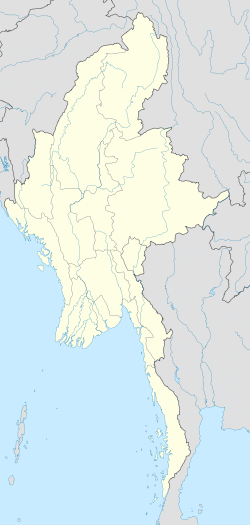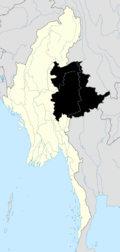
The Wa people are a Southeast Asian ethnic group that lives mainly in Northern Myanmar, in the northern part of Shan State and the eastern part of Kachin State, near and along Myanmar's border with China, as well as in China's Yunnan Province.

The Shan people, also known as the Tai Long or Tai Yai, are a Tai ethnic group of Southeast Asia. The Shan are the biggest minority of Burma (Myanmar) and primarily live in the Shan State of this country, but also inhabit parts of Mandalay Region, Kachin State, Kayah State, Sagaing Region and Kayin State, and in adjacent regions of China, Laos, Assam and Meghalaya, Cambodia, Vietnam and Thailand. Though no reliable census has been taken in Burma since 1935, the Shan are estimated to number 4–6 million, with CIA Factbook giving an estimate of five million spread throughout Myanmar which is about 10% of the overall Burmese population.

Shan State is a state of Myanmar. Shan State borders China (Yunnan) to the north, Laos to the east, and Thailand to the south, and five administrative divisions of Burma (Myanmar) in the west. The largest of the 14 administrative divisions by land area, Shan State covers 155,800 km2, almost a quarter of the total area of Myanmar. The state gets its name from Burmese name for the Tai peoples: "Shan people". The Tai (Shan) constitute the majority among several ethnic groups that inhabit the area. Shanland is largely rural, with only three cities of significant size: Lashio, Kengtung, and the capital, Taunggyi. Taunggyi is 150.7 km northeast of the nation's capital Naypyitaw.

Khun Sa was an ethnic Chinese drug lord and warlord. He was born in Hpa Hpeung village, in the Loi Maw ward of Mongyai, Northern Shan State, Burma. Before he assumed the Shan name "Khun Sa" in 1976, he was known primarily by his Chinese name, Zhang Qifu (張奇夫).

Wa State is an autonomous self-governing polity in Myanmar (Burma). It is de facto independent from the rest of the country and has its own political system, administrative divisions and army. While the Wa State government recognises Myanmar's sovereignty over all of its territory, this does not include allegiance to any specific government. The 2008 Constitution of Myanmar officially recognises the northern part of Wa State as the Wa Self-Administered Division of Shan State. As a one-party socialist state ruled by the United Wa State Party (UWSP), which split from the Communist Party of Burma (CPB) in 1989, Wa State is divided into three counties, two special districts, and one economic development zone. The administrative capital is Pangkham, formerly known as Pangsang. The name Wa is derived from the Wa ethnic group, who speak an Austroasiatic language.

The United Wa State Army, abbreviated as the UWSA or the UWS Army, is the military wing of the United Wa State Party (UWSP), the de facto ruling party of Wa State in Myanmar. It is a well-equipped ethnic minority army of an estimated 20,000–30,000 Wa soldiers, led by Bao Youxiang. The UWSA was formed after the collapse of the armed wing of the Communist Party of Burma (CPB) in 1989.
Mong Ton also known historically as Möngtung and Maington, is a town and seat of Mong Ton Township in Mong Hsat District, Shan State in eastern Myanmar near the border with Thailand. Mong is equivalent to [Township or land]."Ton"is equivalent to [Royal City]. It is located in the Daen Lao Range, in the eastern part of the Shan State, east of the Salween River. Mong Ton lies on the National Highway 22 and connected to NarrkgMuu and Ponparkyin, is also connected to Mong Hsat by National Highway 49 which begins to the north-east of the town.
Mong Hsat is a town in the Shan State of Myanmar, the capital of Mong Hsat Township. It is served by Monghsat Airport.

Wei Hsueh-kang, also known by various other names, is a Chinese-born business tycoon and drug trafficker wanted by the United States and Thailand for illegally trafficking drugs in New York and Southeast Asia's Golden Triangle. He is also a regional commander of the United Wa State Army, the armed forces of the de facto independent Wa State in Myanmar.

The Shan State Army – South, also known simply as the Shan State Army, is the armed wing of the Restoration Council of Shan State (RCSS) and one of the largest insurgent groups in Myanmar (Burma). The SSA-S was led by Lieutenant General Yawd Serk until his resignation on 3 February 2014. Yawd Serk was reelected chairman of the RCSS shortly after his resignation and has remained chairman since.

The Shan State Army was one of the largest insurgent groups that fought government forces in Shan State, Myanmar (Burma). The SSA was founded in 1964 after the merging of two existing insurgent groups.

Muse is the capital of Mu Se Township in northern Shan State, Myanmar. It is situated on the Shweli River, and is connected by a bridge to Ruili in Yunnan Province, China. The border town is a major regional trade hub with China, accounting for 70% of cross-border trade between the two nations.

The Mong Tai Army, was an insurgent group consisting of soldiers from the Shan minority in Myanmar, founded in 1985 by Khun Sa. It had up to 20,000 armed troops at its peak, and was one of the largest forces opposing the government of Myanmar at its time. It was also involved in drug trafficking in Southeast Asia.
Mong Nawng, Mong Naung or Mongnawng is a town in Shan State, Myanmar. It is located a few miles to the west of the Nam Pang river.
Mong La Township is a subdivision of Kengtung District, Shan State, Myanmar. The area borders China and Laos. The principal town is Mong La.

The Shan State National Army was a Shan nationalist insurgent group that fought against the then ruling State Peace and Development Council military regime of Myanmar (Burma). The commander of the SSNA was Colonel Kan Yod.

The Shan State Army – North, also known as Shan State Army/Special Region 3 (SSA/SR-3) is a Shan nationalist insurgent group in Myanmar (Burma). It is the armed wing of the Shan State Progress Party (SSPP).

The National Democratic Alliance Army (NDAA) is an insurgent group in eastern Shan State, Myanmar (Burma). It is the armed wing of the Peace and Solidarity Committee (PSC).
The Kuomintang in Burma or Kuomintang in the Golden Triangle were Kuomintang troops that fled from China to Burma in 1950 after their defeat by the Chinese communists in the Chinese Civil War. They were commanded by General Li Mi. It attempted several incursions into Yunnan in the early 1950s, only to be pushed back into Burma each time by the Chinese Communist Party's People's Liberation Army.

















